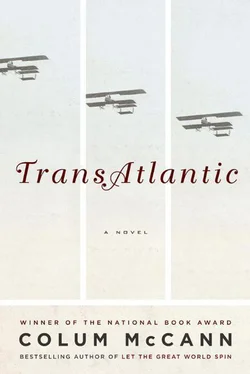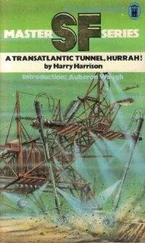— Leave your grandfather sleep a minute.
Lottie leans over the car seat and tucks the blanket around Ambrose’s neck. He gives the faint hint of a snore. The ground has been turned to mush. Puddles and tire tracks. She has forgotten her Wellington boots and she slops her way towards the back of the car.
— Give me a hand here, Tomas, good lad.
He slouches against the side of the car and stretches out his arms, his hair down over his eyes.
— Buy yourself some windscreen wipers.
He squints at her, perplexed, until she swipes the curls away from his brow. He laughs and Lottie loads him up with bags, books, blankets, directs him towards the house. She watches him drift through the long grass at the side of the cottage, the stalks brushing wet against his jeans. He still wears large elephant flares. His shirt hanging out at the rear. Never a boy for fashion. He struggles under the load, almost slips, but finds his footing in the gravel near the front door, steadies himself.
He slides towards the half-door — the top portion open, the bottom closed — and leans his way into the cottage. Half in, half out. The load he carries propped on the rim of the door. Even from a distance Lottie can hear the high greeting of her daughter from inside. The spill of happiness out the door. An apron. A few strands of hair over Hannah’s blue eyes. A smell of tobacco when they hug.
— Where’s Dad?
— Snoozing. Leave him two minutes.
— Did you roll down the window?
— Of course. Are they at it yet?
— They put out the decoys at five this morning.
— They what?
— They began in the dark.
And, as if on cue, Lottie hears her first gunshot of the weekend. Followed quickly by a second. She turns to see a flock of birds bursting their way over the cottage.
AMBROSE WAS, IN his time, a good shot, too. A few of the men from the linen business would get together on the autumn weekends. Headlamps pouring down the road in pale shrouds in the early mist. Boots. Duck-hunting hats. Tweeds. Green slickers. Brownings tucked away in rifle bags, slung over their shoulders. They walked out the island road with the dogs trotting behind them, Labradors, yellow and black. She could hear the heeltaps on gravel as they moved away. They returned in the late afternoon, a faint smell of gunpowder from their clothes. Pochard, tufted duck, goldeneye. They made a ritual of dropping brandy in the boiling water to ease the pellets, they said, from the flesh. She could never taste the meat without thinking of flight.
Arthur Brown. God rest him. She still has the unopened letter from her youth. He is dead now these past thirty years. His own son, Buster, smashed out of the clouds on a mission of war. The second savaging of the century. The failed experiment of peace. She recalls Brown at his home in Swansea, standing on the low wall, his body bent backwards, the ball in midflight and an arc of brief joy on his face.
RANDOM GUNFIRE PUNCTUATES breakfast. She sits in the kitchen, with Hannah at the table, the red-and-white-checked tablecloth spread out in front of them. Tomas perches by the fire, reading, while Ambrose takes a stroll along the shore between naps.
She is happy to spend some time alone with her daughter: it happens less and less these days. The inevitable teapot, the butter, the scones. The lilies leaning in a tabletop vase. The hard whiff of tobacco: Lottie allows it to drift across her face.
On the windowsill stand a bunch of opened letters and a checkbook. Destiny has given her daughter two things — an agile mind, and a gift, or a curse, for giving away money. It has been that way for years: as a child on the Malone Road she would come home shoeless. Even now, there is always a check being dropped in an envelope. Red Cross. Oxfam. Shaftesbury Children’s Home.
— What in the world is Amnesty International?
— Just another bunch of Canadians, Mother.
— Does the postman not hate you?
— I’m on their watch list.
Lottie holds the bundle of letters in the air, flicks through them as if they were a moving cartoon: pound notes disappearing over the hill.
— Everything I know I learned from you, Mum.
Not a lie. She was, in her day, hardly a penny-pincher. Still, always a mother. Impossible to escape. She wraps an elastic band around the checkbook, tries to hide it behind the flowerpot.
They weave the hours away, moving fluidly around one another, swapping spoons, handing off bowls, borrowing dishtowels from one another’s shoulders. The state of the farm. The pulse of the village. The business Hannah has made with the purebred dogs.
Hannah’s hands have aged a little. Thirty-eight years old now, half her life a mother herself. A tilework to her skin. A braid of veins at the base of her wrist. Such a curious thing, to watch your daughter grow older. That odd inheritance.
— Tomas behaving himself up there, is he, then?
— Playing tennis every Wednesday.
— Good on him.
A wistful note in her daughter’s voice: Not driving you mad with that new stereo of his, is he?
— Sure the two of us are deaf anyway.
Hannah turns and takes the bread from the stove. With bare hands. A scorch at her fingertips. She steps to the kitchen sink, runs cold water on the burn.
— I was thinking, Mum. You know. Maybe you’d have a word with him? Maybe he’d go out, just this once? Lawrence has been talking about him all week long.
— You’re his mother.
— Aye. He listens to you but.
— He could maybe row out the decoys.
— He could, that.
Through the window, along the shore, she spies Ambrose wandering under the brown of his hat. He has always loved the lake. It stretches beyond him, a wide plash of gray. He will come in shortly, she knows, rubbing his hands together, looking for the warmth of a fire, a small brandy and a newspaper, the ordinary pleasures of an early September.
THE HUNTERS RETURN at lunchtime, trudging along the laneway, shotguns swinging. She doesn’t know many of them. Friends of Lawrence. A lawyer, a councilman, an artisan boatmaker.
— Where’s Tomas? says Lawrence.
— Beyond in his room.
Lawrence wears his shirt buttoned high. He is big-boned underneath it. He holds, by the neck, two goldeneyes. He drops the birds on the table, turns away, fills his pipe with tobacco, tamps it on the heel of his hand.
— He’ll be on then for tomorrow?
— Ach, leave him be, says Hannah.
— Do him the world of good.
— Lawrence. Please.
He shrugs off his cardigan and hangs it by the edge of the fire, mutters. A big man, a small voice. He livens when he joins his friends in the living room.
By late afternoon Lottie and Hannah have their hands in the warm guts of a cooked bird. Hannah pulls her fingers expertly along the bottom of the body and the flesh separates in her fingers. She spreads the meat out on a platter, with some slices of apple and a berry garnish. An extravagant gesture of color.
The men sit at the table, eating, all except Tomas. Jackets draped over the backs of their chairs. Hats perched on the windowsill. A loud laughter rolling amongst them. An ease to the day. A slow banter. A sliding away.
SHE IS GLAD to see Tomas emerge from his room, darkdown, when the guests have left. He wears an old fisherman’s sweater many sizes too big, belonging once to Ambrose. He wanders around, an air of sleep still about him. Nods to Lawrence across the room. A gulf between them, stepfather and son. Always a layer of cloud.
He rows out in the evening, after dinner, to check his star charts. In his long wading boots. Binoculars at his neck. They can see him operate on the lake, a small pinpoint of red flashlight drifting along the shore. There is a low moon, a small rip of wind across the lough.
Читать дальше












